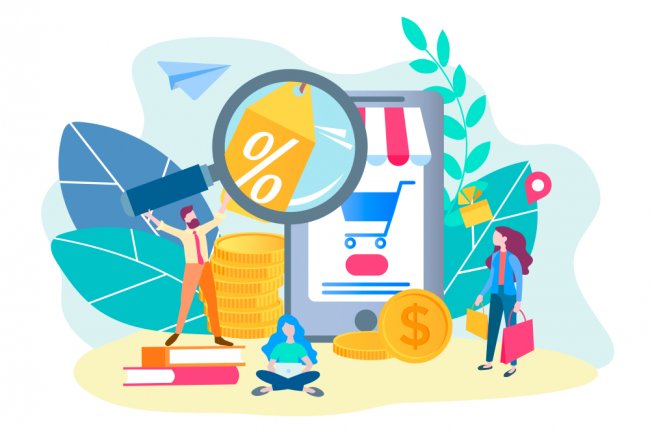Why blogging is important for an ecommerce site ?
You have an ecommerce. Do you want to boost your traffic and improve your conversion rate? Then you have to keep a blog. It’s not the most common piece of advice, but it’s probably one of the most important in the end. Rest assured, you don't have to post an article every two days to get meaningful results. If you have an ecommerce site, you should seriously consider the idea of starting a blog! We tell you why.

Creating a blog improves the SEO of your ecommerce site
Creating an ecommerce site is one thing, developing your traffic is another. To grow your ecommerce business, your turnover, your profits, you need to do two things:
- Increase traffic, that is to say the number of visitors, the audience ...
- Improve your conversion rates> the proportion of visitors who turn into customers, who buy.
Why create a blog on your ecommerce site? The first answer is that it helps improve your site's SEO. Natural referencing refers to the visibility of the pages of your site on search engines (on Google in particular). You need to aim for good natural referencing, that is, to make sure that the pages of your ecommerce site stand out in the first results of Google on your target queries.
Regularly posting new content is one of the main techniques for improving the SEO of your site. For several reasons :
- This increases the number of pages on your site and makes it possible to densify the internal mesh, that is to say to increase the internal links between the different pages of your site. On this important subject, discover "How to build your internal network?".
- This provides backlinks, that is, links on third party sites or social networks that link to pages on your site - in this case to articles on your blog. Backlinks have a very important role in SEO. On this subject, read our article: "9 effective techniques to generate backlinks". However, it is difficult to get backlinks when the site you have only has product pages ...
- This sends a very important signal to search engines: your site is alive, active, regularly enriched with new pages. Publishing regularly is the key to maintaining and improving SEO.
- This allows you to "work" on your key phrases and keywords - that is, those associated with your business, the products you sell. For example, if you sell jewelry, you could write an article answering a question that some of your potential customers may have, such as: "What jewelry to give at a baptism?" ". The ecommerce jewelry seller Cleor had this idea.
This is a great technique, by the way: if you're looking for story ideas, list the questions your potential customers have on search engines. Do you sell clothes for pregnant people? Imagine yourself as a pregnant woman and list her concerns. Ultimately, each question can be the subject of an article! Every time a visitor to your site sends you a comment with a question, why not post the answer as a blog post?
In SEO, content is king. Creating lots of quality content is the best way to improve the visibility of your ecommerce site on Google and other search engines. This is why you need to blog.
In this recently published study, the Content Marketing Institute asked B2C marketers what content marketing brings them (publishing content on a website). As we can see, creating content, particularly via a blog, is not only used to improve natural referencing.
As we said at the very beginning of this article, your goal is twofold: to improve inbound traffic to your ecommerce site and to improve the conversion rate. We have seen that blogging achieves the first goal. We will now see that this also achieves the second objective.
In ecommerce, the blog is a storytelling tool and a way to create an emotional bond with your customers.

Natural referencing is a lever of customer conquest. It improves the visibility of your online store and attracts more people to your site. The blog is a tool for customer acquisition, but it is also, and this is what we are going to talk about here, a tool for loyalty. Blogging allows you to build a community spirit, to create a link between your customers and your brand.
Indeed, the blog is the best medium for sharing your values, your news, your state of mind. A blog allows you to do storytelling, to tell your story, that of your company, of your team. The blog post is the perfect format for telling a story. Neither too long nor too short. You can incorporate visuals into your articles to make them more lively and engaging. Michel & Augustin is particularly strong in the art of storytelling.
Keeping an ecommerce blog is also the way to present your products in their best light - your flagship products, your new products. Where did you get the idea from? How are they produced? What are their characteristics ?
In short, the blog is a channel for customer dialogue and customer dialogue is the key to customer loyalty.
Maintain an ecommerce blog to develop your notoriety, position yourself as an expert in your field and reassure your visitors

Writing well-written and interesting content leads to more readers and more shares. This ultimately results in an improvement in your natural referencing. The links to your site, whether from social networks, other blogs, forums, are all positive signals sent to Google.
Keeping an ecommerce blog can boost the number of shares on social networks and links. If you only have static pages on your ecommerce site (for example your "About us" page, how would you like to share pages from your site on social networks? You cannot share the same pages indefinitely Hence the importance of dynamic pages.
Posting blog posts on your business site can show your visitors and potential customers that you are an expert in your field. To show it and prove it. In e-commerce, one of the big issues is reinsurance. Internet users are a priori wary of e-commerce sites since they are not known brands. Keeping a blog allows you to reassure your audience, to give them confidence, to show that you are a serious and reliable merchant.
How do you find great blog post ideas?

When we advise a merchant to blog, the answer is invariably the same every time: "I don't have any writing skills" or "I don't have the time". We must not reason in this way. We've seen that blogging isn't just a little extra. This can have a huge impact on growing your traffic and improving your conversion rates. You necessarily have the time to write one article per week. No need to write novels. The important thing is to write relevant articles that are likely to interest your target audience. 300 - 400 words can do the trick!
The real challenge isn't writing the articles, it's finding the topics. You can do this by consulting the sites and blogs that deal with your theme, which are related to the products you sell. Reading what others write is always inspiring.
You can write articles about:
- The history of your company, its genesis, its values, its growth, its vision.
- Your products. How were they designed? How are they made? Where are they from? What are they used for? How to use them? What are their characteristics ?
- Your news: events, new product launches, sales announcements, promotions ...
- News in your niche. If you sell swimming pools, keep your customers informed about regulatory changes.
If you really feel like you can't write a single line, if you're definitely upset with the spelling, consider hiring a freelance copywriter. Today, it is very easy to find them, especially thanks to platforms like Malt or Freelancer.
Conclusion
You will understand, we would not encourage you too much to start a blog on your ecommerce site. Some ecommerce CMS make it very easy to implement a blog on your ecommerce. This is the case with Wix for example. Blogging will allow you to make your site more lively, more human, richer, more interactive too (via shares, comments) - not to mention the decisive impact that a blog that regularly posts articles can have on SEO.
It is true that blogging requires a certain investment, especially time. But if you really want to grow your ecommerce business, time spent managing your blog won't be wasted time. This may be the best way to use your time.














